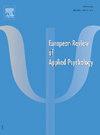Mesurer la pensée critique de futurs enseignants : éléments de validation d’échelles dans trois nations francophones
IF 1.4
4区 心理学
Q3 PSYCHOLOGY, APPLIED
European Review of Applied Psychology-Revue Europeenne De Psychologie Appliquee
Pub Date : 2025-08-28
DOI:10.1016/j.erap.2025.101110
引用次数: 0
Abstract
Introduction
Despite the importance of critical thinking in discourses or skills frameworks, this concept remains challenging to identify. Although the theoretical foundations are solid, the phenomenon is not easily quantified.
Objective
This article aims to contribute to developing French versions of critical thinking measurement tools by testing translated skills (HCTA; Halpern, 2010) and dispositions (CriTT; Stupple et al., 2017) tests in three French-speaking nations in Europe and America.
Methodology
The validity study of instruments scores was done in two steps, in a preliminary collection (n = 102) with principal component analyses, and in a main collection in Wallonia, France and Quebec (n = 245) with confirmatory factorial analyses.
Results
The proposed scales have positive metric qualities, particularly in terms of score reliability (respectively ωt = .78, α = .66 and ωt = .92, α = .92).
Conclusion
It allows us to apprehend them as solid alternatives to existing scales. We conclude this article by discussing their respective limitations.
衡量未来教师的批判性思维:三个法语国家量表的验证要素
尽管批判性思维在话语或技能框架中很重要,但这个概念仍然具有挑战性。虽然理论基础是坚实的,但这种现象并不容易量化。本文旨在通过在欧洲和美国的三个法语国家测试翻译技能(HCTA; Halpern, 2010)和性格(CriTT; Stupple等人,2017)测试,为开发法语版批判性思维测量工具做出贡献。方法:工具评分的效度研究分两步进行,在初步收集(n = 102)中采用主成分分析,在法国瓦隆尼亚和魁北克的主要收集(n = 245)中采用验证性析因分析。结果所设计的量表具有良好的度量质量,特别是在得分信度方面(ωt = )。78年,α = 。66 ωt = 。92年,α = .92)。它使我们能够将它们理解为现有尺度的可靠替代品。我们通过讨论它们各自的局限性来结束本文。
本文章由计算机程序翻译,如有差异,请以英文原文为准。
求助全文
约1分钟内获得全文
求助全文
来源期刊

European Review of Applied Psychology-Revue Europeenne De Psychologie Appliquee
PSYCHOLOGY, APPLIED-
CiteScore
2.20
自引率
20.00%
发文量
38
期刊介绍:
The aim of the Revue européenne de Psychologie appliquée / European Review of Applied Psychology is to promote high-quality applications of psychology to all areas of specialization, and to foster exchange among researchers and professionals. Its policy is to attract a wide range of contributions, including empirical research, overviews of target issues, case studies, descriptions of instruments for research and diagnosis, and theoretical work related to applied psychology. In all cases, authors will refer to published and verificable facts, whether established in the study being reported or in earlier publications.
 求助内容:
求助内容: 应助结果提醒方式:
应助结果提醒方式:


